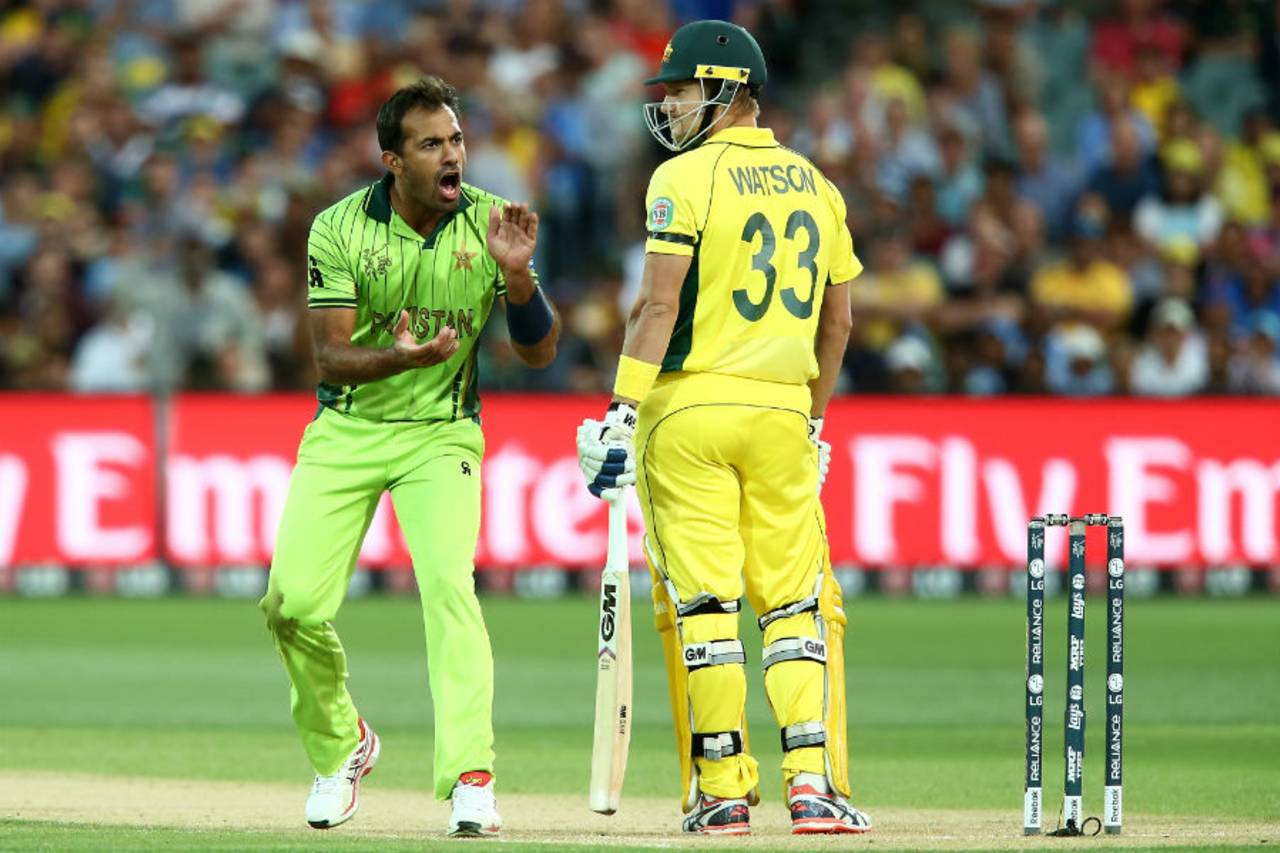Wahab Riaz: pace is pace yaar
Have you ever had the experience of watching a Pakistan fast bowler attempt to defend a slim total?
Hamza Khan
Apr 9, 2015, 11:40 AM

Wahab Riaz got on the nerves of Australia with an 'angry' spell of fast bowling • Getty Images
Ever had an experience where you are not really there, but you are there? A moment stuck in time wherein the thrill of witnessing what someone is doing, the 'why' of that performance is lost in between? Let me rephrase the question, have you ever had the experience of watching a Pakistan fast bowler attempt to defend a slim total?
At the biggest stage, in front of a large hostile Adelaide crowd, Wahab Riaz came up with a performance so sensational that the players watching it in the stadium, the 30,000-plus crowd present in the stadium, and the millions watching it on the television will remember it for years to come.
Wahab's bowling was filled with undisguised anger; it was a near miracle he didn't lose control of his bowling or temper. His bowling seemed a direct response to his team's insipid batting and the sledging from the Aussies, who had got under his skin right from the moment he came to the crease. Perhaps the Australians sensed that in the absence of Irfan, roughing Wahab up was the key, and continued their ploy of getting on the nerves of the opposition. In that, they ended up complimenting him, perhaps inadvertently reaffirming Wahab of his value and prowess.
The first eight overs were captivating yes, but one felt a slight uneasiness, inevitability even as to when Misbah would introduce Wahab. What could he do? The tension Wahab brought into the opposition was visible in Warner's first shot, a mistimed cut off the back foot off a short and wide delivery that went for three runs The second ball to Warner was a wide flung down leg. And then Wahab struck, a short rising ball which Warner could not control, caught ironically in hindsight, by Rahat at third man.
Enter Michael Clarke. Wahab is cranking up 90 mph in his first over. A short-leg fielder comes up to say hello. The fourth ball of the second over is venomous, it is a missile aimed at the narrow length between Clarke's neck and head. Wahab cruelly choses to exploit Clarke's weak back. The Australian captain could only fend off the ball to forward short leg. And Wahab had burst the door open. Angry, fast and hungry for more.
Wahab was in complete sync with the most quintessential of human instincts that day - he was the hunter. His rhythmic run-up and delivery was hypnotising. Your pulse raced with the rise and fall of his own. As a spectator on TV, you felt your emotions spilling over and body temperature rising a few degrees as the force that is Wahab overwhelmed everything else. In that moment, you felt a part of your soul had formed a neural connection of sorts with Wahab and the impact of his aggression.
Wahab hurled bouncer after bouncer, reminding Watson about the bat he had come out with. Wahab bullied Watson and brought him out of his comfort zone - a battle that transcended the result of the match itself. We were moved by one man's mastery of swing and pace that dominated the opposition.
The bouncers stood out, often tearing open the portal to the Bodyline series in Adelaide in 1932-33. With two close-in catchers on the leg side, Misbah certainly attacked. Judging by Wahab's accuracy, in hindsight, he could probably have had all others in the deep to come up and threaten Watson further.
That Wahab couldn't inflict more damage was due poor fielding. Also, the resilience of Watson and Steven Smith cannot be ignored. One can only imagine what would have become of Pakistan batting had they faced such a ferocious spell of bowling. When Wahab returned for a second spell the game was as good as loft, but he still gave Pakistan hope. Maxwell made an ugly attempt at a pull that went high towards third man. Predictably, this attempt to catch the ball was doubly ugly. It was dropped and Wahab screamed in anguish and the World Cup was over for Pakistan. The rest was just semantics, the last rites of one of those many 'what-if' games Pakistan has been a part of. Coach Waqar Younis may consider putting an arm around Wahab, and let him know why he and Wasim Akram concentrated more on bowling the batsman and trapping them lbw.
Considering the chaotic management and inconsistency of Pakistan, I had tried to disassociate myself from the team's World Cup campaign, dispassionately declaring for a need to lose 0-6 in the group stages so that the disease which plagues Pakistan cricket does not remain covered. A friend asked me the day after the match that why was I so emotional about the result now, and I could only respond with a phrase fast becoming a legend, courtesy some Pakistan cricket journalists and fans, "Kya karun yaar, Pace is Pace Yaar (What to do man, Pace is Pace man)."
If you have a submission for Inbox, send it to us here, with "Inbox" in the subject line.
Hamza Ahmed Khan is a risk & management consultant by profession, who fell in love with cricket watching Saeed Anwar in the 1996 World Cup quarter final. Co-hosts a useless cricket podcast. @GumbyAKhan